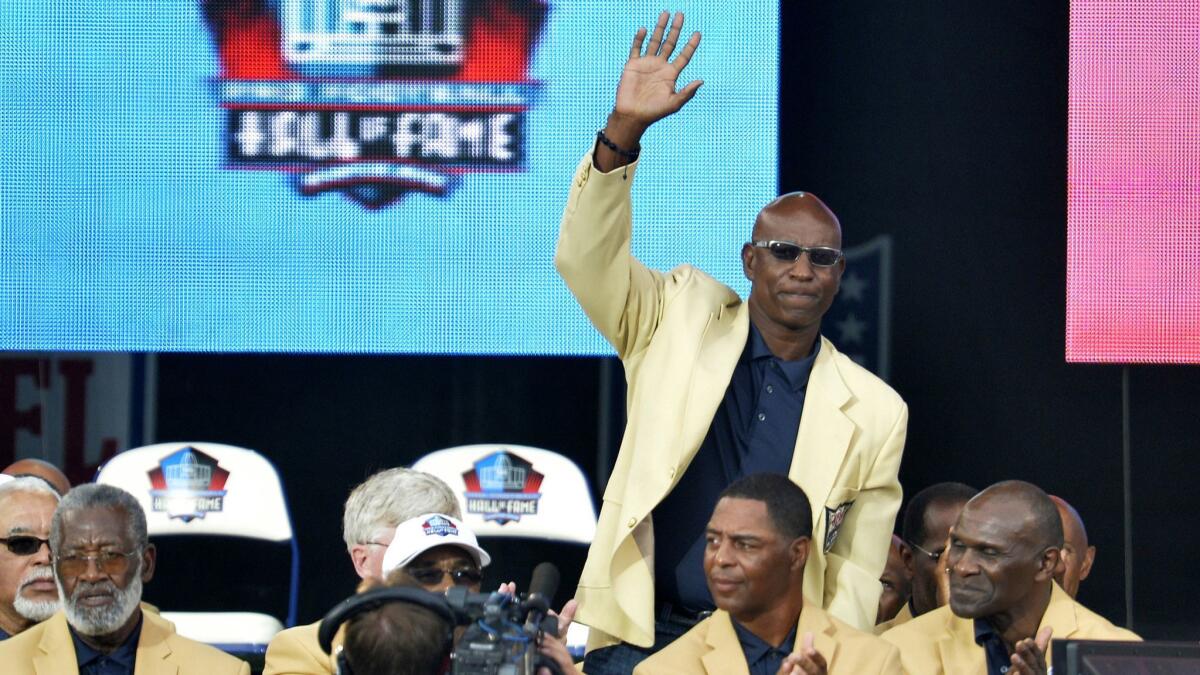Hall of Fame group asks NFL for lifetime benefits, threatens boycott of enshrinement ceremonies

- Share via
A group of Pro Football Hall of Fame members delivered an unmistakable message Tuesday to the NFL and the players union:
Show me the money.
In a three-page letter addressed to NFL Commissioner Roger Goodell, NFL Players Assn. Executive Director DeMaurice Smith, and Hall of Fame President David Baker, the group of legendary players threatened to boycott the enshrinement ceremonies in Canton, Ohio, if they didn’t get lifetime health insurance and an annual salary that includes a share of league revenue.
“We demand nothing less than this,” writes Rams great Eric Dickerson, who is spearheading the effort. “In the past, the NFL has tried to appease retired players… [b]ut from our own experience, and in speaking with other retired players, we know that such bureaucracies have proven to be little more than cynical public relations ploys that fail to help those who desperately need it. Commissioner Goodell, we know better, and fans do too.”
There are 318 Hall of Famers, 182 of whom are living.
The letter lists 22 signatories, some of the biggest names in the game, among them Jim Brown, Marcus Allen, Jerry Rice, Deion Sanders, and Lawrence Taylor, along with the widow of Reggie White. But the letter misspells the name of one Hall of Famer, listing Carl Eller’s last name as “Ellard.” Another former player on the list, Kurt Warner, said on Twitter that while he generally supports the cause, he did not agree to have his name attached to the letter.
“I feel we can make a great case to the NFL for their support of these efforts, however, I do not believe boycotting is the means to the end in this instance,” said Warner, an analyst at the league-owned NFL Network.
In a written statement, Baker said that many players have reached out to voice their support of the Hall of Fame.
“While we enshrine Hall of Famers, our mission is to serve every player who helped build this great game,” Baker said. “We guard the legacies and seek to serve all players and not just Hall of Famers who we serve every day.”
The letter takes issue with the NFL paying Goodell $40 million per year and the $1-billion price tag of the planned Hall of Fame Village in Canton.
“Meanwhile, many of us Hall of Fame players can’t walk and many can’t sleep at night,” Dickerson writes. “More than a few of us don’t know who or where we are. Our long careers left us especially vulnerable to the dangers of this violent sport, especially those intentionally hidden from us.”
In the letter, Dickerson said the total cost for every Hall of Famer to have health insurance is less than $4 million, “less than the cost of a 30-second Super Bowl ad, or about 3 cents for every $100 the league generates in revenue.”
The letter compares NFL retirement benefits to those of Major League Baseball.
“A baseball player who has appeared on a Major League roster for one day is entitled to health insurance for the rest of his life,” Dickerson writes. “A player employed on a roster for 43 days gets a lifelong pension.
“The NFL is notorious for the hard line it takes against players in negotiations. Yet the league always seems to have plenty of money for other priorities.”
[According to baseball’s pension plan, a player with one day of service in a season gets paid health insurance until the beginning of the next season. A player with four years of service can buy the insurance plan for the rest of his life.]
The NFL established a pension plan in 1959, though many retired players say it is grossly insufficient and in some cases considerably less than $1,000 per month. In the 1993 collective bargaining agreement, a 401K plan to which players also could contribute was established, and in 1998 an annuity program.
A key issue in the 2011 labor dispute was establishing a fund for pre-1993 players. That led to the creation of the “Legacy Fund,” with a $620-million increase in benefits, with team owners contributing from their share of revenues for the first time. The union and the league have increased pensions three times for former players since 2011.
In a phone call Tuesday, Dickerson told the Los Angeles Times that the intent is ultimately to win benefits for all retired players, but the Hall of Famers have leverage.
“If I had just started with the retired players, I wouldn’t have gotten their attention,” he said. “But when you start with the Hall of Fame guys, you get their attention. Those names are recognizable.
“You’re not going to have all [182] guys support this. Some of them are going to say, ‘I don’t know. I don’t know.’ But if the health care comes, and the money comes, I guarantee they’ll take it.”
Follow Sam Farmer on Twitter @LATimesfarmer
More to Read
Go beyond the scoreboard
Get the latest on L.A.'s teams in the daily Sports Report newsletter.
You may occasionally receive promotional content from the Los Angeles Times.











